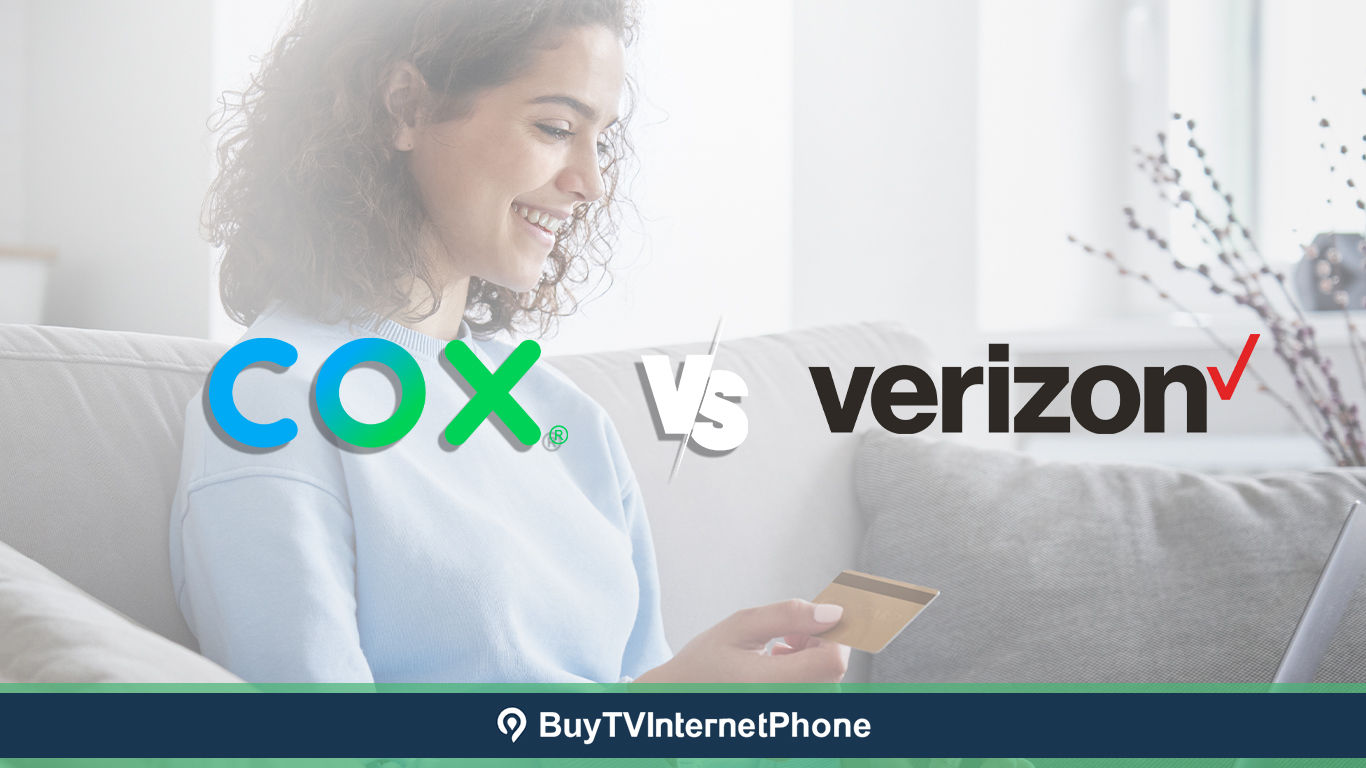
Cox Communications offers high-speed fiber-backed cable internet plans with a generous data cap. On the other hand, Verizon gives you near symmetrical speeds and unlimited data through its powerful 100% fiber-optic network.
Here’s a glimpse at what both internet service providers (ISPs) have in store:
for 24 months.
w/ Auto Pay & any Verizon mobile phone plan
See Details
Both Cox and Verizon Fios (fiber) are solid choices if you’re looking for a fast and reliable internet connection for your home, but at the end of the day, you’ve got to choose one. Therefore, let’s begin an in-depth comparison to make that decision easier.
While no ISP is perfect, each has its strengths and weaknesses. Learning the pros and cons of signing up for Cox Communications or Verizon Internet will make you think about what matters to you, so you can select the one that best suits your requirements and preferences.
Both Cox and Verizon offer residential internet plans delivering download speeds up to 2 Gbps. While Verizon Fios delivers near symmetrical speeds, the upload speeds from Cox are much lower.
Verizon features four amazing fiber internet plans to choose from. Router is included in the price of all plans, and you get a three to five-year price guarantee.
|
Verizon Fios Internet Plan |
Download & Upload Speed |
Price |
Subscribe |
|
Fios 300 |
Up to 300 Mbps |
$34.99/mo. |
|
|
Fios 500 |
Up to 500 Mbps |
$59.99/mo. |
|
|
Fios 1 Gig |
Up to 940 Mbps |
$74.99/mo. |
|
|
Fios 2 Gig |
Up to 2.3 Gbps |
$94.99/mo. |
Cox presents four equally competitive plans to choose from. When you subscribe to Cox Internet, you gain access to more than four million Wi-Fi hotspots nationwide and free advanced security.
|
Internet Plan |
Max. Download Speed |
Prices |
Subscribe |
| 300 Mbps | 300 Mbps |
$55/mo. for 24 months |
|
| 500 Mbps | 500 Mbps |
$80/mo. for 24 months |
|
| 1 GIG | 1000 Mbps |
$95/mo. for 24 months |
|
| 2 GIG | 2000 Mbps |
$115/mo . for 24 months |
Every home needs internet and TV for the daily dose of entertainment, and Cox delivers:
| Cox Internet + TV Package | Internet Download Speeds | TV Channel Count | Price | Subscribe |
| 300 Mbps + Preferred TV | Up to 300 Mbps | 140+ |
$185/mo.
For 24 months |
ORDER NOW |
| 500 Mbps + Ultimate TV | Up to 500 Mbps | 250+ |
$205/mo. For 24 months |
ORDER NOW |
While Verizon does not offer conventional cable TV, you can bundle your internet plan with your favorite streaming services. You can get over 40% discount on Disney+, Hulu, ESPN+, Netflix, and Max(With Ads) – Order Now!
Verizon does not impose any data caps on its fiber internet plans. This means you can indulge in high-quality streaming/gaming and download content without worrying about overage fees and throttling. While Cox does not offer unlimited data, the 1.2 TB data cap is quite generous. For the average household, it’s highly unlikely to exhaust that amount of data in a month. To give you a better sense of it, here’s what you can do in a day:
Even after you’ve done everything on the list above, you’ll still have used less than half of your data limit.
Both Cox and Verizon offer contract-free plans; hence, no long-term commitment is needed. You can pay as you go and cancel service without repercussions, such as early termination fees.
Cox charges about $100 for professional installation, but you can avoid the expense by applying for the self-install kit, which is free of charge. Verizon Fios professional setup charges are $99; you can save money with the self-install option, but that is only available if your home is fiber-ready.
Are you leaning towards Cox Internet, or did Verizon Internet captivate you from the start? In case you still can’t decide, let’s break it down further:
Both Verizon Fios and Cox offer similar download speeds, but Verizon delivers much faster upload speeds.
You can check availability in your area from our Verizon Fios page or contact customer service.
While Cox Internet is a good option for gaming, Verizon Fiber Internet is recommended for its near-symmetrical speeds and ultra-low latency.
Cox is the better choice for bundling, as it lets you combine your internet plan with TV and phone at affordable rates.
5G home internet’s wireless infrastructure makes it a convenient option for apartment dwellers, though it is not as fast and reliable as Cox cable internet.